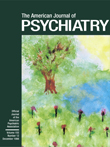Word Recall in Schizophrenia: A Connectionist Model
Abstract
Objective:The authors examined word recall of patients with schizophrenia by using an experimental paradigm generated from connectionist models of memory.Method:Schizophrenic patients and normal comparison subjects first studied and then recalled a list of 32 words of equal difficulty. Both the connectivity (associative strength) and the network size (number of associates) of the words varied in such a way that the list contained equal proportions of four types of words: 1) high connectivity-small network size, 2) low connectivity-small network size, 3) high connectivity-large network size, and 4) low connectivity-large network size. Results:The schizophrenic patients recalled fewer words and showed a particularly pronounced effect of the connectivity of the to-be-remembered words. For the patients, regardless of network size, recall improved substantially for words of high connectivity and declined dramatically for words of low connectivity. By contrast, the comparison subjects showed the expected effects, with the best recall for words of high connectivity-small network size, followed by words of low connectivity-small network size, then by words of high connectivity-large network size, and finally by words of low connectivity-large network size. Conclusions:Schizophrenia may be characterized by faulty modulation of associative links within a putative lexicon that is thought to be widely distributed across frontal and temporal lobes. Am J Psychiatry 1998; 155: 1685-1690



